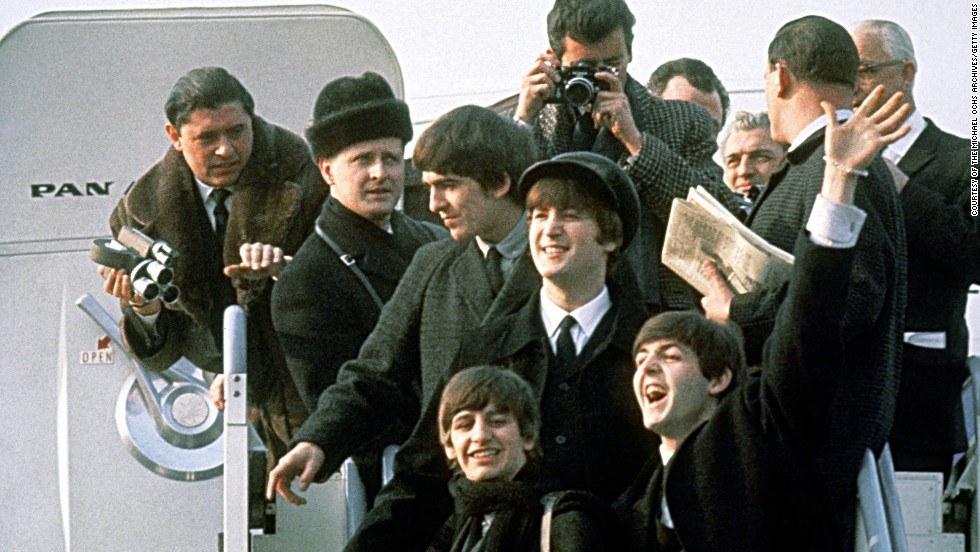
One million Instagram hashtags, 15 million Facebook likes and a verified Twitter account with nearly 200,000 followers, including E! Entertainment who called him a heartthrob while wishing him happy birthday. Is this the latest bubble gum pop star or on-screen bad boy? Nope- this is a man who hasn't been alive for 35 years.
John Winston Lennon was born at 6:30 p.m. on Oct. 9, 1940 in Liverpool, England. After meeting fellow Liverpudlian Paul McCartney, they went on to form a little band in the '60s called The Beatles. When the band officially broke up in 1970 Lennon enjoyed a successful solo career and took on the role of political activist until being fatally shot in the back outside his Manhattan apartment at 10:50 p.m. on Dec. 9, 1980.

How does a musician who was born before the invention of microwaves, roll-on deodorant and color television, still have such a following with Millennials?
To understand the fascination now, you have to understand the fascination then. While in The Beatles, Lennon and his three bandmates took the world by storm. 'Beatlemania' caused a frenzy around the globe in a way that pop culture hadn't seen yet. The baby boom meant there were more teen fans than for previous musical acts. Boys wanted to be them and girls wanted to be with them. Everywhere The Beatles went, mobs of screaming, crying and even fainting fans went with them. Their first American telecast on The Ed Sullivan Show had 40 per cent of the American population watching it. A New York airport official who dealt with the crowds of fans in 1964 told the media "We've never seen anything like this before, ever. Never. Not even for kings and queens."

After the Beatles, Lennon began to blur the lines between entertainer and activist. Lover and fighter. Social commenter and sex symbol. Rebel rock star and peaceful protester. In March of '69 he spent six days advocating peace and speaking out against human suffering caused by world conflict. He did not do this while traveling across the globe, speaking behind a podium, wearing a suit and matching tie. Instead he lay in bed with his wife Yoko Ono. While wearing pajamas, sporting unkempt hair past his shoulders and a keeping a guitar on his bed, he invited the press up to his Amsterdam hotel room to the 'Bed-In' for 12 hours a day to discuss the issues that plagued the world. The rock star side came out in July as he released Give Peace a Chance. Inspired by the 'Bed-In' the song became the anthem of anti-Vietnam War movements.
"Lennon became the spokesperson for rock music when it came to taking an anti-war stance and speaking out for peace in the world," thinks Thomas Groulx, who devotes his time to teaching 'The History of Rock and Roll' at St. Clair College. "He not only expressed his dissatisfaction with political policies in his music but he backed that by his actions. Most musicians were not willing to go as far as he did for fear that their careers may be jeopardized."

But are the world issues of the '60s and '70s really that different from the issues today?
In his 1971 song Imagine Lennon wrote "Imagine no possessions. I wonder if you can. No need for greed or hunger. A brotherhood of man. Imagine all the people, sharing all the world."
By that time there had been hundreds of race-related riots. The 1967 Detroit riots saw the city burning for five days after the frustration of people in the city reached the breaking point. The Baltimore riot was one of multiple riots after the shooting of Martin Luther King. Jr. when people filled the streets and confronted police.
It would be two more years before the board of the American Psychiatric Association removed homosexuality from its list of mental illnesses and four more years until the Vietnam War ended after going on for nearly 20 years.
In 2015 Baltimore and other cities again saw riots and civil unrest after 25-year-old resident Freddie Gray was killed by police. 250 people were arrested and a state of emergency was declared in the city. In June same-sex marriage was legalized in the US and the war in Syria rages on.
Are the youth of the '60s and '70s really that different either?

For Eveline Csomor, the values that Lennon had still ring true today.
"He's all about peace and love. That was the legacy he tried to leave behind. Something like that doesn't just go away."
The passion in her voice is clear as she says Lennon and the Beatles changed her life and how she gets an indescribable feeling about reading Lennon's quotes on love, revolution and equality.
Although she was born 10 years after he died, a simple Google search of 'John Lennon' brings up around 67 million pages, making it easy for her to feel like she almost knew her personally.
And even though Lennon himself was born 58 years before Google existed, it seems that it takes a lot longer than that for his values to be forgotten.

So John, thanks for keeping the positive vibes going after all these years!

